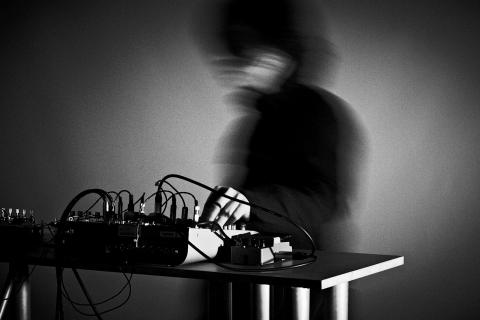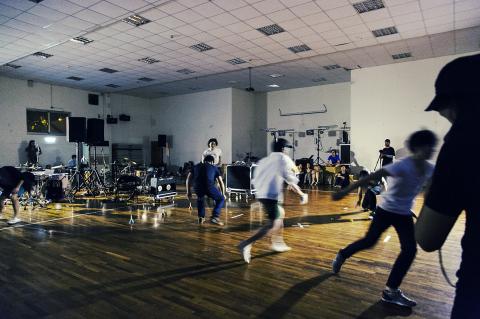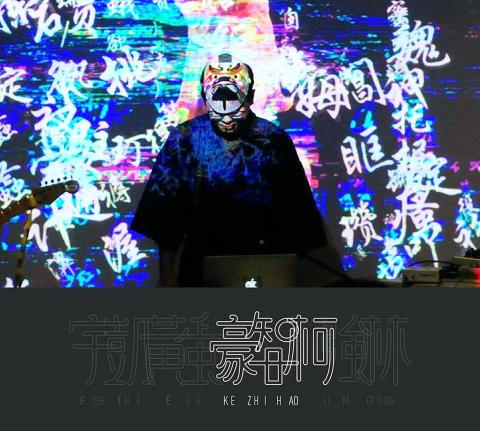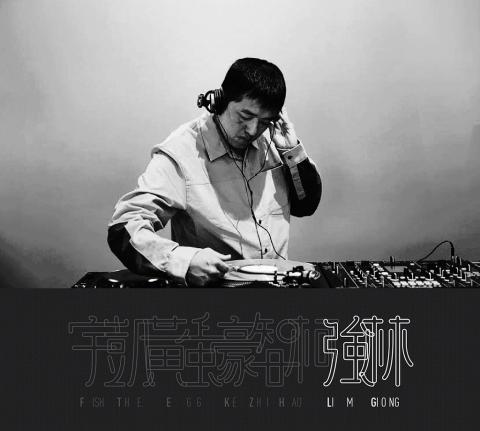Some call it avant-garde, some call it experimental and some just call it noise.
Whatever it is, it’s been happening at the Lacking Sound Festival (失聲祭) on a monthly basis for the past eight years. The aural extravaganza strives to explore sound as an art form through boundary-breaking, hybrid performances that involve cutting edge, non-traditional technology.
Now the event is celebrating its 100th edition by throwing celebratory parties tonight and on Jan. 22 at The Wall (這牆). Some of the country’s leading noise makers, sound wizards and electronic musicians will be lining up for the occasion, such as Fujui Wang (王福瑞), Lim Giong (林強), fish.the (real name Huang Kai–yu, 黃凱宇) and Dawang Yingfan Huang (黃大旺).

Photo courtesy of Lacking Sound Festival
Lacking Sound came about in 2007, around the time when Her-He Party, a series of free outdoor shindigs under Huazhong Bridge (華中橋) in Taipei came to a close. Co-founded by Lim in 2003, Her-He Party is said to have influenced many young participants with its liberal attitude and openness to music, setting itself apart from the rave scene at the time, which was besmirched with money and commercialism.
Among the inspired, Yao Chung-han (姚仲涵), then an art student at Taipei National University of the Arts, established Lacking Sound with several of his classmates, in the hope of creating a community of sound artists and fostering an audience, to whom the chances of seeing, let along discussing, works of sound art were few and far between, with the exception of occasional art festivals and exhibitions.
As a regular avenue dedicated to sonic performances, exhibitions and research, Lacking Sound not only organizes shows and forums by local and foreign artists, but has become increasingly dedicated to creating audio-visual documentation, articles and studies about its favorite subject in Taiwan.

Photo courtesy of Lacking Sound Festival
For its 100th edition, the festival teams up with Kandala Records (旃陀羅公社), a noise/avant-garde label set up by noise pundit Chang Yo-sheng (張又升) in 2009, to put forth what promises to be a memorable, two-night festivity. Tonight’s headliners include Lim and fish.the, both important figures in Taiwan’s electronic music scene and the brains behind Her-He Party. Electronic maestro fish.the, in particular, will spin bleeps and buzzes from his long overdue debut album Gong (宮). Multi-award winning composer and guitarist Blaire Ko (柯智豪) will also join in on the fun.
On Jan. 22, partygoers should make sure they have enough energy as the second celebration is a nine-hour audio-visual marathon. Kicking off the show is a collaboration by local new media artist Wang Chung-kun (王仲?) and GayBird (梁基爵) from Hong Kong, using air hoses as their musical instruments. Noise maker Dawang Yingfan Huang will put on his raw, boisterous and borderline trashy solo performance, while pioneering sound artist Fujui Wang will create a group show with his juniors, including Yao, Yeh Ting-hao (葉廷皓) and Lu Yi (盧藝).
Later that night, an electronica party is slated to take place and run till the break of dawn. The lineup features sound artist Betty Apple (鄭宜蘋), Ziet, EAOW! and electronic musician Al Burro from London.

Photo courtesy of Lacking Sound Festival

Photo courtesy of Lacking Sound Festival

In recent weeks the Trump Administration has been demanding that Taiwan transfer half of its chip manufacturing to the US. In an interview with NewsNation, US Secretary of Commerce Howard Lutnick said that the US would need 50 percent of domestic chip production to protect Taiwan. He stated, discussing Taiwan’s chip production: “My argument to them was, well, if you have 95 percent, how am I gonna get it to protect you? You’re going to put it on a plane? You’re going to put it on a boat?” The stench of the Trump Administration’s mafia-style notions of “protection” was strong

Every now and then, it’s nice to just point somewhere on a map and head out with no plan. In Taiwan, where convenience reigns, food options are plentiful and people are generally friendly and helpful, this type of trip is that much easier to pull off. One day last November, a spur-of-the-moment day hike in the hills of Chiayi County turned into a surprisingly memorable experience that impressed on me once again how fortunate we all are to call this island home. The scenery I walked through that day — a mix of forest and farms reaching up into the clouds

With one week left until election day, the drama is high in the race for the Chinese Nationalist Party (KMT) chair. The race is still potentially wide open between the three frontrunners. The most accurate poll is done by Apollo Survey & Research Co (艾普羅民調公司), which was conducted a week and a half ago with two-thirds of the respondents party members, who are the only ones eligible to vote. For details on the candidates, check the Oct. 4 edition of this column, “A look at the KMT chair candidates” on page 12. The popular frontrunner was 56-year-old Cheng Li-wun (鄭麗文)

Oct. 13 to Oct. 19 When ordered to resign from her teaching position in June 1928 due to her husband’s anti-colonial activities, Lin Shih-hao (林氏好) refused to back down. The next day, she still showed up at Tainan Second Preschool, where she was warned that she would be fired if she didn’t comply. Lin continued to ignore the orders and was eventually let go without severance — even losing her pay for that month. Rather than despairing, she found a non-government job and even joined her husband Lu Ping-ting’s (盧丙丁) non-violent resistance and labor rights movements. When the government’s 1931 crackdown